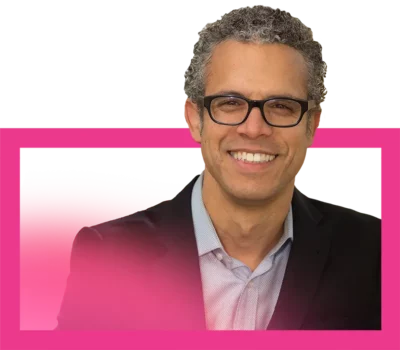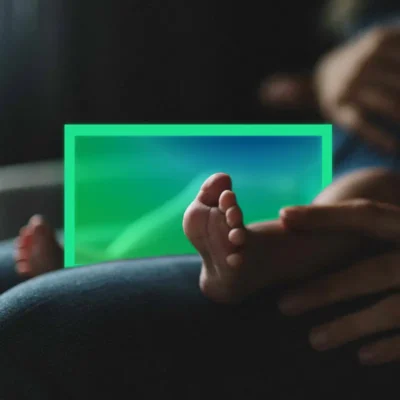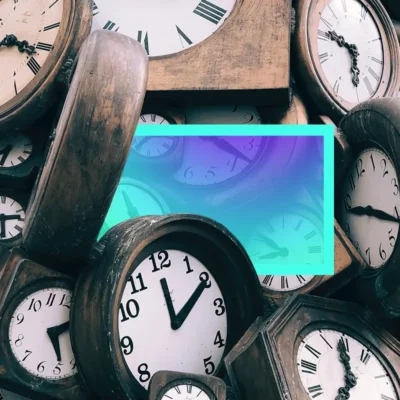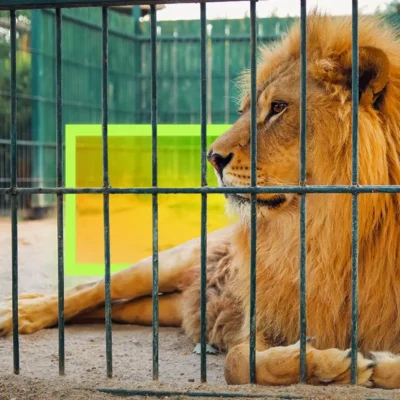Reframing the question
We’re inviting you into the Meditative Story library to explore the idea: what’s possible when you reframe the question? You’ll hear excerpts from some of our most beloved episodes in which storytellers see challenges from a new perspective, reframe something that they might have been stuck on, and ultimately move forward with a new sense of possibility.
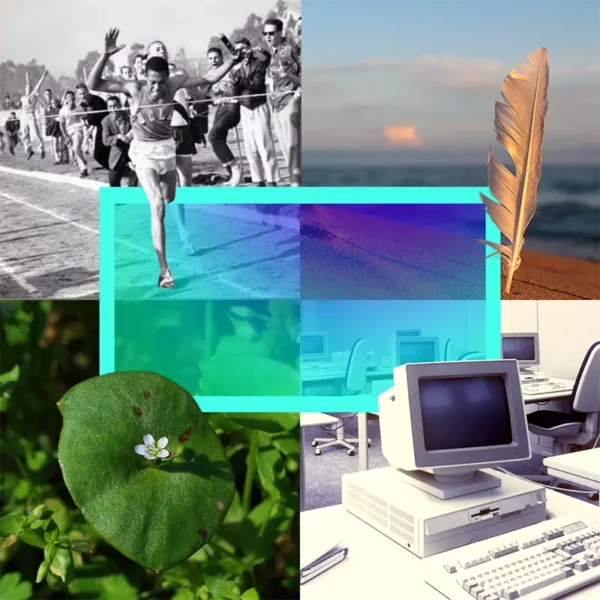
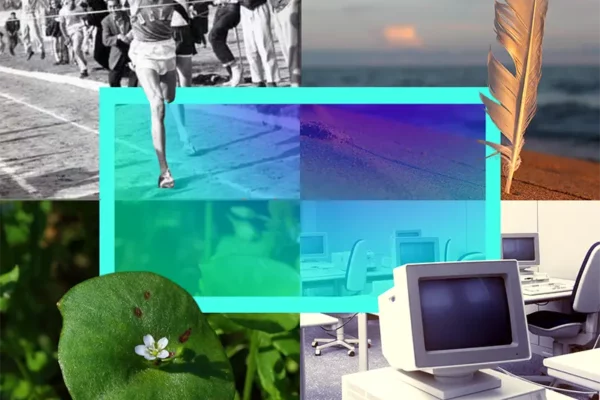
Transcript:
Reframing the question
ROHAN GUNATILLAKE: Hi everyone, Rohan here. Today’s episode is such a treat. We’re inviting you into the Meditative Story library to explore the idea: what’s possible when you reframe the question? You’ll hear excerpts from some of our most beloved episodes in which storytellers see challenges from a new perspective, reframe something that they might have been stuck on, and ultimately move forward with a new sense of possibility.
We’ll provide links to the full stories in our show notes so you can explore each in its entirety.
We’ll start with Omar Wasow. He has a fabulous life as a reporter and tech expert, but an important piece of unfinished business from his college days keeps nagging at him. Omar experiences paralyzing doubt. As you’ll hear, it’s through the eyes of a child that Omar is finally able to surrender the belief that his ability is fixed, and open himself to new possibilities.
Like Omar, I’ve found sometimes a little shift in perspective is enough to turn the tide.
In this series, we combine immersive first-person stories and breathtaking music with the
science-backed benefits of mindfulness practice. From WaitWhat and Thrive Global, this is a
Meditative Story. I’m Rohan, and I’ll be your guide.
The body relaxed. The body breathing. Your senses open. Your mind open. Meeting the world
OMAR WASOW: “Class, say hello to our guests!”
A dozen bright little faces scattered around this hive of a room whip around toward me.
I helped co-found this Brooklyn charter school, and a few board members and I are touring. We’ve walked into a sunny, happily chaotic third-grade class. Giant windows frame the teacher as she floats from student to student. I find myself standing next to a girl hunched over a fractions worksheet. When she glances up at me, her look of abject confusion is one I’d recognize anywhere.
“I can’t do fractions.” It’s so final, the way she says it.
“Of course you can do fractions! Everyone can.”
I crouch down. Her worksheet is filled with numbers and scratches. Clearly she’s been trying.
“Everyone can learn fractions. Think of it like a pizza pie.”
My little pep talk seems to help. I see something click. Her eyes twinkle. She turns away from me to dive back into the problem. She doesn’t give up.
One of the board members walks over. It’s time to move on. But for the rest of the hour, I can’t stop picturing that girl’s face.
My thoughts drift to my own moments of desperation in high school, panicking under that blue light from my old Mac. In Stanford’s silent computer lab, agonizing over code. I realize that when things get hard, I have no idea what to do next. In my mind, I have a natural gift for this kind of work, and it should be easy. When it isn’t, my stress spikes, but I only double down. I never ask my professors for help. I never reconsider the story in my head.
The little girl had what seemed to be the opposite story. I told myself, “Of course I can.” She told herself, “Of course I can’t.” In truth, though, we were telling ourselves two sides of the same story: our abilities are fixed. The real difference between us is that she got a little bit of coaching and threw herself back at the task. She was open to the possibility of growth.
Maybe I could be, too.
That’s when it happens. That’s when the story in my head changes. I’d been waiting for some kind of innate talent to flourish but, really, I just needed a little bit of guidance to dive back in.
As the possibility of finishing college becomes real, other dreams start to become a little more tangible, too. I love a lot about my work as an entrepreneur and TV reporter, but I have questions about the world that won’t get answered in these jobs. I resolve to go to graduate school.
I just have to finish these papers. I have to complete them.
GUNATILLAKE: That’s when the story in my head changes. Sometimes it is a nudge like this from an unexpected encounter that allows the lens to adjust.
For author Vanessa Hua, however, the catalyst for her shift in view comes from the kingdom of plants. When the state of isolation brought on by the last couple of years has her physically and emotionally shredded, it’s the ancient art of foraging that reframes her connection to others and to the world around her.
VANESSA HUA: While out foraging with my sons, I pay closer attention to the conversations that I sometimes had listened to with only half an ear. In my fiction writing, I reach for the precise details that fully flesh out my characters, major and minor.
All of this noticing, this seeing – it transforms me, turns me from passive to active. A switch flips inside me. I feel open to the world and its wonders, not braced for its gloom.
I don’t have to go anywhere special. Walks around my neighborhood or just a few miles from home always turn up surprises. I don’t have special tools, either – just a blue fanny pack with lots of zippered pockets into which I can drop my finds. To anyone passing by, I might appear a bit strange – especially if they spot me scaling a tree for plums or rooting in the underbrush for a handful of greens.
My mother is ecstatic when I bring back loquats, what she calls pipa. The golden coins of fruit have the taste of tangy peaches. She remembers them from her childhood in Taiwan, but never found them in the supermarkets here. A taste she thought lost, now recovered.
Looking up and outwards at the world around me, I gain this skill that makes me feel more at home, at a time when we are at home more than ever, but in such an eerie way. Amid the chaos, foraging’s guidelines seem like rules to live by: Don’t be greedy; leave enough for animals, other foragers, and for the plants to propagate; pick in areas away from pollution and pesticides; follow local laws and regulations; look for multiple characteristics to confirm a find; seek advice from a mentor.
As I climb through the hills, my synapses fire in a way that feels alive. Spanish moss veils the branches of the live oaks, and the head-clearing scent of eucalyptus tinges the air. I think about how freedom of movement gets threatened, time and again, though it’s a fundamental right. Later, digging into research, I learn about anti-trespass laws enacted in the South after the Civil War to restrict foraging among freed slaves, who gathered wild foods to sell and eat.
I’m inspired by the resilience of those who have foraged before me. By prehistoric ancestors who hunted and gathered for millennia. By the witchy power of those who possess the medicinal secrets of the forest. By the indigenous and immigrant families who carry on their cultural traditions. The impoverished who search for wild foods to keep from starving. The earlier me felt so disconnected from this history. Now, though, I find this shared lineage reassuring.
GUNATILLAKE: Observing the natural world can surely offer fresh ways to reframe even the most challenging of moments. Sometimes, however, life presents an event that so imprints itself that its grip shapes our point of view for years afterwards.
As a young man, and a track star at UCLA, Russ Ellis dreams of running his way to a gold medal. After he comes in fourth at the Olympic trials, just shy of a ticket to the Games, those few seconds haunt Russ for years. Until the day when the grace of time shows him just so far he’s come.
RUSS ELLIS: My failure at the Coliseum becomes the defining feature of my otherwise happy being. The wound threads itself into the fabric of our family. Dad didn’t make it to the Olympics, and that’s very sad.
Ironically, I counsel bereft students about this very fallacy all the time at Berkeley. Getting a “B” instead of an “A” isn’t who you are, I tell them, it’s just something that happened. An event. But my wisdom only flows outward.
The world turns. After a wonderful career at Berkeley, I take an early retirement. In my 60s I reinvent myself once more, taking up stone carving, then bronze work, and metal. I move on to painting, and have several shows. I’m a grandfather now, all new levels of joy. Maybe it’s the joy that causes me, at the age of 85, to start recording original songs. My kids, both musicians, help me. I call my first album Songs from the Garden. You know how you get a song in your head sometimes? I now get whole orchestrated movements.
One afternoon recently, because of my age or perhaps the quietude that Covid has brought, I find myself in a looking-back mode. You know, taking stock. What did I just do? What was that?
And that race — why did it have such staying power? The answer to this last one? Partly timing. I was still in the oven, so to speak, when it happened, still forming — those experiences stick.
But at a deeper level, I suspect I’d stumbled upon a tangible embodiment of an often intangible feeling: What might’ve been?
Aren’t we all plagued by that at some point? What might’ve been. The question isn’t abstract or amorphous in my case. It’s disturbingly quantifiable. That’s what a race is: a quantifiable fork in the road. Run a little faster and my life, the full trajectory of my existence, would’ve been different.
But of course the trouble with what might’ve been is that it blinds you to what is. That day at the Coliseum was a loss, that much is true. But what if it was a gift as well?
When I stopped gunning single-mindedly for the Olympics, all those years back, I slipped, chastened, into a life of peregrination. I wandered the landscape, finding joy here and there, never biting down hard on any one thing. A professor, an administrator, an artist, a singer, a partner, a father. For so long I thought this peregrination was my great penance. Now, replaying the footage, yet another dry summer giving way to another smoky fall, I see it in a new light. It is my great life.
GUNATILLAKE: It can just be time that allows us to reframe how we’re seeing. Thank you, Russ, for that beautiful reminder.
Our final storyteller, Gracia María, shares a deeply personal experience relating to the loss of her father. For Gracia, the pain of saying goodbye also contains the seeds of a new way of relating to herself and to others.
GRACIA MARIA: In life, our greatest challenges – and our greatest potential – come from those closest to us. Our parents. Our partners. Our children.
If you pray to become more patient, the universe will begin throwing you all sorts of opportunities to practice what it is to actually have patience. It’s not like you wake up one day, and you’re just a super patient person. You’re just given chance after chance, exercise after exercise, to practice patience. Most often with the people you love.
Here, I was preaching all these beautiful things to other people, and not embodying it myself. I tell other people: “Don’t judge others. Just stand in your own truth.” Then the universe breaks in and says, “Okay, really? Let’s see if you pass this next test.” And then boom. Another chance to practice what I know deep within myself.
Through his passing, my father gives me the opportunity to be my most authentic self. To give others the opportunity to see me. And to give them a chance to awaken themselves.
Many people worry that others won’t resonate with you when you express your authentic self. But it just isn’t true. When you’re your authentic self, you’re phenomenal. You’re perfect. You radiate so much pristine light, which comes from a place that is only love. How could someone not resonate with that?
Every parent and child have a contract between them. And I think my father’s contract with me is to always remind me how magic is a serious business. It takes a lot of serious commitment and wisdom to anchor my life in magic.
Many months later, when I wake up in the morning, I open the glass door to my balcony which overlooks the bay. It’s Father’s Day. The warmth and sunshine flood in. A dove rests quietly on the balcony. It leaves a single brown feather on the stone floor. Some people don’t believe in signs. I’m alright with that. But I do. I believe this is my father visiting me again. I believe this is my father’s magic.
I carry dad with me into everything. He teaches me even more now, but there are so many things just for him and me to keep. We’re still always creating beautiful spaces to meet one another in. Gracias Papi.
GUNATILLAKE: Thank you Gracía, Russ, Vanessa, and Omar. And thank you for taking the time to be with us. That was quite a journey. How’re you doing?
Do what you need to do to feel settled. Breathing. Smiling.
We’re so happy to bring you these stories, and hope that what we’ve shared might help reframe whatever you’re going through. Sometimes shaking up the snowglobe of our personal narratives can bring a lightness, helping us to put down a load long carried, or face a challenge with renewed vigor.
It makes me think of Voyager 1’s breathtaking photograph of Earth as seen from a distance of nearly 4 billion miles. Do you know it? Our whole planet, a pale blue dot. Sometimes seeing things from a new angle, everything falls into place, has more space.
If you’d like to share any insights that might have struck you today, feel free to reach out at [email protected]. We’d love to hear from you.
I look forward to reflecting on another theme with you soon. Until then, we’ll be back next week with another storyteller, and the start of Meditative Story’s fifth Season. From here in Glasgow, Scotland, and on behalf of our team in New York, thank you for listening.
If you enjoyed what you heard, we invite you to share it with a friend. And if Meditative Story is making a real difference in your life, please consider leaving a review wherever you listen to podcasts.

